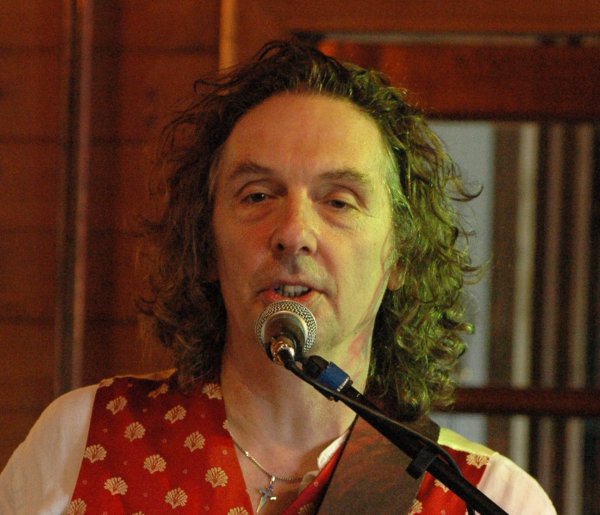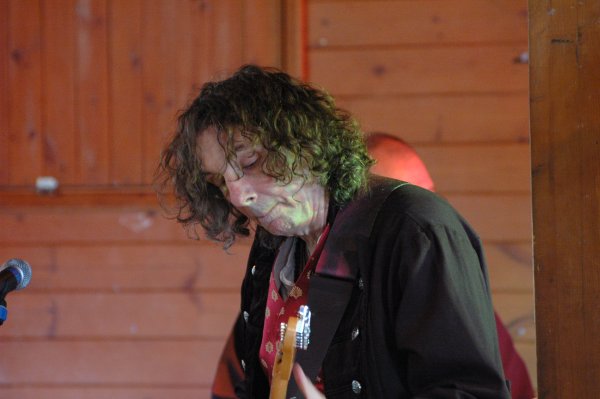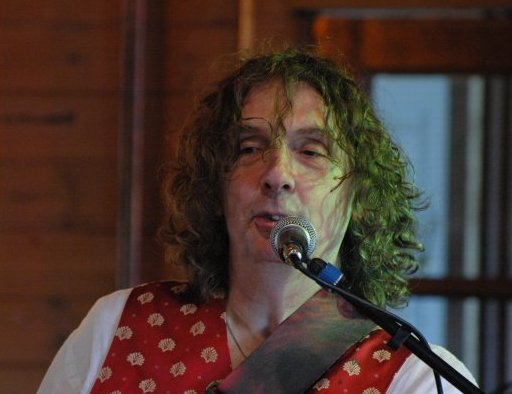|
Interview Francis Lickerish (The Enid / Secret Green) "I always see the world of commercial music as completely impenetrable" (November 2010, text and live pictures by Ian Murphy, edited by Peter Willemsen) Francis Lickerish has been a musician all his life. While most of us have dreams of being a rock star that we soon grow out of, Lickerish has been able to live his dreams. Recently, Background Magazine were invited to visit Lickerish at his home in Dorset, England where we talked with him about his music, The Enid, Secret Green and what influenced his music. Did you spend a lot of time at folk fairs as a child? “There was a lot of that and a lot of opera. My mother was involved with Sadler Wells Opera and my father and brother were into folk music so it was part of the family culture.”Were you taught to compose music at school? “It wasn't that I left school, but more that I was invited to leave school. That is what led to my ending up at Finchdon Manor where they encouraged you to try and attain your own shape rather than one that had been imposed by the system. Although I liked to write music at that time it was pretty basic.”Did you target the lute or guitar with your composing? “It wasn't for any instrument really and I still don't write for any particular instrument . Our guitar player in Secret Green is Jon Beedle and he is a straightforward rock guitar player. He says my stuff sounds a little weird. That's probably because I tend to use the guitar as an orchestral instrument. If you listen to the early Enid, the guitar parts are not strictly guitar they are much more orchestral and the guitar is just the instrument I use to play the music with.”How did your composing style mix with Robert John Godfrey in the early days of The Enid? “Early Enid was very much a collaboration with Robert and I. Robert was the technical force and I the melodic one. The use of the guitars was more orchestral than anyone else out there and I don't think that has passed which is why The Enid is unique. If you listen closely you can tell my influence, it's the folksy stuff. Robert is much more Rachmaninoff, but the two styles worked well together. It was very difficult early on because everything was done completely live with no backing tape. I wonder now how we ever did that. I can't think of anyone else who did what we did.”How hard is it to compose such large pieces? “Very thankfully, modern software allows me access to a huge post romantic symphony orchestra. What I do is use the orchestra as an instrument. This type of composing does make it difficult to engage with other people and I think Robert will say the same. One of the problems with a lot of music is that it's like the fairy tale of the emperor's new clothes. A lot gets rehashed over and over again until it's tired. I'm always trying to present something different. There is a lot of thinking, a 3D-process to the music I write in a way. All the tracks are linked with themes that run through them. They're not composed in parts but as a whole. What I do is more symphonic than operatic. I don't want to compare myself to proper composers although I am one. My songs, and in particular the album I'm writing now, are more tone poems. You could even call them symphonic poems.”As well as The Enid, you've had quite a varied musical career including touring with Kim Wilde which is very pop rock. Have you ever been tempted to move in that direction? “I don't want to. I don't mind doing it for other people. I've worked with French singer Patti Lane to complete her album. I arranged and produced it, but I'm not sure I could write commercial songs. I always see the world of commercial music as completely impenetrable. There is a misapprehension that all you need to do is write something that's commercial and you will get discovered. Take Lily Allen. The urban myth is that the internet did it all for her, but a famous dad and a lot of money helped.”I spoke to record label Kscope a while ago. They told me that the relationship between labels and bands is changing. “The climate in this country is very difficult indeed, very hard. There are a lot of venues but nowhere to play. No-one will put you on unless you are a tribute band. Don't know where it is going because the culture has changed so enormously. When The Enid started there were thousands of places to play, lots of small places. I remember playing the Paradise Rooms in Burton-on-Trent, 200 people crammed in to watch us. We've sent out a lot of Secret Green CD's and To Wake The King is a great album but getting gigs is just hard.”So what's next for you? “I've been doing some lute playing at weddings and things but I'm hopeless at the marketing side. I'm a musician not a marketing person. I have mild dyspraxia which means I can deal with some things, but my head goes static with others. My ideal would be to find somebody who would take on that aspect. At the moment Secret Green is rehearsing the songs for our next album and getting ready to go into the studio again. We have our Christmas gig lined up at the same place we performed last year.”Thank you for this interview. “You're welcome.”More info about Francis Lickerish on the Internet: Website Francis Lickerish Website The Enid Website Secret Green samples review The Enid album 'Arise and Shine, Volume 1' review The Enid album 'Journey's End' review Secret Green album 'To Wake The King' |


